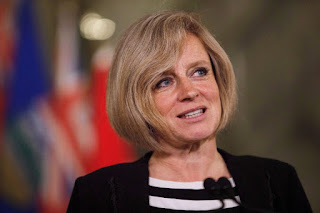It would be a lot easier if social democratic governments were elected during flush times. But voters turn to social democrats when times are tough. Consider the case of Rachel Notley’s government in Alberta. Tom Walkom writes:
Notley was elected last May on a wave of discontent. The ruling Progressive Conservatives were seen as out of touch. Their fiscal solutions — spending cuts plus tax increases for the middle class — were thought unfair.
Some voters moved to the even more right-of-centre Wildrose Party. Others gravitated to the NDP, with its call for higher taxes on corporations and the rich, action on climate change and more spending on infrastructure, health and education.On winning power, Notley moved quickly to implement part of her platform. She raised taxes for corporations and the well-to-do. She also announced a new carbon tax set to take effect next year.She did all of this without antagonizing the main corporate players in Alberta’s oilsands.
The collapse in world oil prices and the consequent recession in Alberta have changed everything.A fiscal update this week from the provincial finance department predicts that Alberta’s economy will shrink by 2.7 per cent this year, while the unemployment rate will hover at about 8 per cent.
Government stimulus is expected to create 10,000 new jobs this year. But that number will be swamped by the 50,000 jobs already lost to the oil-price induced recession.Thanks in part to the Fort McMurray fire, Alberta will face a $10.9 billion deficit this year. The government’s books are not expected to reach balance until 2024.
The NDP government insists it will stay the course — that it will not slash government spending and that it will continue to fight the recession with fiscal stimulus.Logic is on Notley’s side. Her government may be running deficits. But net debt as a percentage of the province’s gross domestic product is still below 4 per cent, a remarkably low measure. By comparison, Ontario’s debt to GDP ratio is about 40 per cent.Her promise to wean Alberta’s economy away from its reliance on the vagaries of world oil prices should, in today’s context, have even more urgency.And her job-creation measures, while not enough to make up completely for the collapse in the oil economy, are better than nothing. Still, the pressure on her government to change course promises to be intense.










